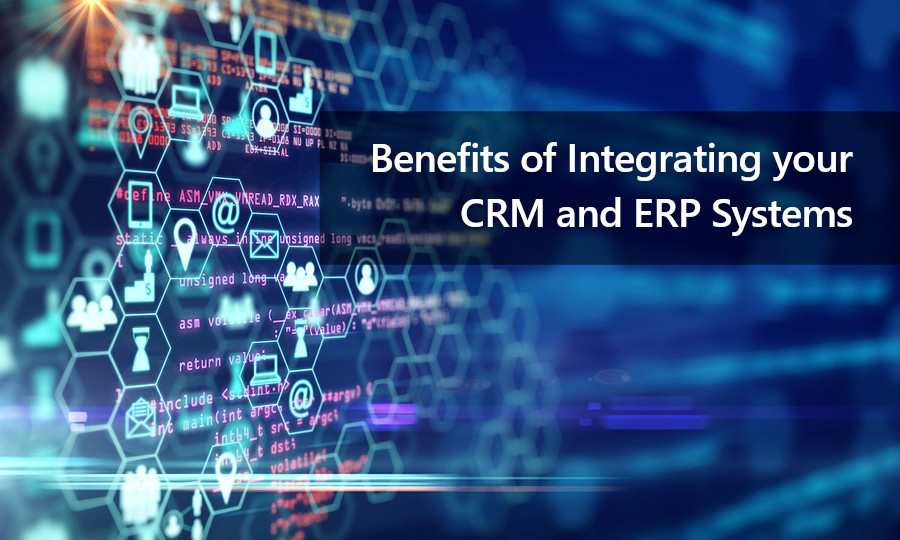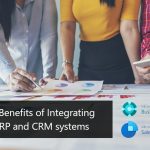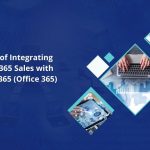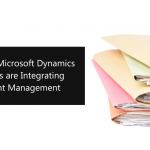
CRM sales software gives sales professionals visibility into their pipeline. Real-time, accurate information allows salespeople to be more responsive and better prepared to meet customer needs. The result is an efficient, effective sales process that boosts revenue.
ERP financials software helps organizations manage the flow of money through their business. From accounting functions like invoicing and receivables management to financial planning for future growth, it keeps your business financially healthy, so you can focus on driving revenue.
Even though these two systems serve very different purposes, they are essential to a company’s overall success. Each provides a piece of the puzzle without which a thriving organization cannot achieve its goals.
What is CRM and ERP Integration, and Why is it Important?
Today, companies use a wide range of software to manage all aspects of the organization, whether sales, marketing, finance, or human resources. This results in several independent systems being used for different purposes, leading to duplication and challenging data management.
To achieve a streamlined process across various departments within an organization, companies need to integrate their business applications.
CRM and ERP integration enables the organization to leverage the best of both worlds, allowing them complete satisfaction of changing customer demands.
CRMs offer enhanced customer relations and act as an ongoing marketing asset within organizations. The timely nature in which sales transactions are sent back to the CRM helps in marketing strategies.
An example is when a customer places an order with an organization via their website. The order is automatically sent to the ERP system, which processes it and updates financial records. Sales professionals can then use this information in future marketing efforts by the organization, including personalized emails or direct mailings. It also helps refine the marketing strategy based on previous customer behavior patterns.
What Are the Benefits of CRM and ERP Integration?
The idea is to ensure that all customer records are updated in CRM and ERP systems. As with all technology solutions, there are always multiple options to choose from. It’s essential to understand the benefits of combining CRM and ERP systems before deciding which solution is right for you. Some of them include:
-
Increased Efficiency and Productivity
With ERP and CRM integration, organizations can now manage all their customer data using one system instead of two. The unified view provided by the integrated system helps to generate better insights into customers, streamline processes, accelerate decision making, and provide faster response times.
-
Improved Customer Service
This integrated solution also benefits sales teams by providing more timely customer activity notifications, allowing them to follow up on potential opportunities easily.
-
Easier Data Access and Reporting
The ERP system derives valuable insights from CRM data, then used for better business planning. For example, if a particular product is selling well in one region but not another, the sales team can use this information to adjust production and distribution.
-
More Accurate Inventory Tracking
Another benefit of CRM and ERP integration is that it allows for a 360-degree view of the customer, seamlessly flowing information between both systems. This is becoming more important as most customers buy from companies across different channels such as social media, websites, or call centers.
The integrated system enables organizations to provide round-the-clock service to their customers, eliminating human intervention.
-
Enhanced Security
ERP integration to CRM improves security by limiting unauthorized access to sensitive data while improving overall record accuracy. It eliminates the need for multiple user IDs and passwords, reducing IT management overheads.
This is particularly beneficial in scenarios where users have to transfer files between systems frequently or when there are many employee changes.
-
Better Organizational Structure
The time saved in managing data between multiple systems is also beneficial to an organization’s bottom line. This unified solution eliminates duplicate work while increasing productivity and ensuring accuracy on every transaction.
With CRM and ERP working together seamlessly, not only do organizations experience increased efficiency, agility, and flexibility, but they also enjoy better business insights with accurate information. This allows them to remain competitive in today’s fast-paced world.
How can CRM and ERP integration help improve your business processes and operations?
ERP/CRM integration is a practice that has become increasingly common due to the advent of cloud computing and virtualization. It has not only made customer data available to organizations in real-time but has also made it easy to share information across different departments and geographical boundaries.
Organizations with CRM sales software and ERP financials software are better equipped to make informed, data-driven decisions because they can see the bigger picture.
ERP financials seamlessly integrates with CRM sales software, giving users access to real-time, holistic information to stay ahead of market trends and plan strategically for future growth.
It provides a unified platform for all customer data and business-critical processes, enabling organizations to use it in various decision-making processes. This tiered approach reduces the cost of upgrading and managing two separate systems and eliminates the need for data synchronization.
Where Can I Seek Assistance/Support?
TMC is an implementation partner that specializes in advising clients on CRM rollouts. We support relevant technologies like Microsoft Dynamics 365 Sales or Salesforce for various industry-specific requirements focusing on innovation and digital transformation initiatives.
Our industry experts help businesses adapt to changing market conditions and support them through their digital transformation initiatives by offering turnkey solutions within CRM sales software and ERP financials that drive growth and increase profits.
Start taking care of your financial and sales needs in one place with Dynamics 365 Sales and Dynamics 365 Business Central. Contact us today to learn more!





